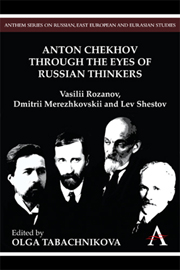 Anton Chekhov Through the Eyes of Russian Thinkers
Anton Chekhov Through the Eyes of Russian Thinkers from Part One - Vasilii Rozanov
Published online by Cambridge University Press: 05 March 2012
Apart from numerous references in other places, Rozanov devoted five essays to Chekhov. In his first essay, written not long before Chekhov's death in 1904, Rozanov, while considering Russia's fate, gives a historic-cultural reading of The Cherry Orchard. In this, Chekhov's last play, Rozanov sees a reflection of the crisis among the Russian people, of not being able to set targets and aspirations in their personal lives: ‘Do you not understand, for what purpose serve love, thoughts, home life, morals, money – for all these people? You cannot take these things with you.’ This crisis leads to the passivity and lack of will in Chekhov's heroes: ‘Lopakhin also saves money, reads Buckle just like Epikhodov (an excellent character, especially upon the stage), Liubov Andreevna is attached to her Parisian gigolo, and Trofimov studies at the university. Each of them is not defined by his role. On stage, however, the figure of the student Trofimov is sympathetic, although idle and passive. He is unable to finish his course, and at the end cannot even find his own boots (which Varia eventually finds for him).’ This crisis of values is witnessed not only in the passive, but in the more active characters: ‘The only aspiration anyone shows is when Lopakhin tries to get hold of money: but it is totally incomprehensible why he needs it: money for money's sake?
To save this book to your Kindle, first ensure no-reply@cambridge.org is added to your Approved Personal Document E-mail List under your Personal Document Settings on the Manage Your Content and Devices page of your Amazon account. Then enter the ‘name’ part of your Kindle email address below. Find out more about saving to your Kindle.
Note you can select to save to either the @free.kindle.com or @kindle.com variations. ‘@free.kindle.com’ emails are free but can only be saved to your device when it is connected to wi-fi. ‘@kindle.com’ emails can be delivered even when you are not connected to wi-fi, but note that service fees apply.
Find out more about the Kindle Personal Document Service.
To save content items to your account, please confirm that you agree to abide by our usage policies. If this is the first time you use this feature, you will be asked to authorise Cambridge Core to connect with your account. Find out more about saving content to Dropbox.
To save content items to your account, please confirm that you agree to abide by our usage policies. If this is the first time you use this feature, you will be asked to authorise Cambridge Core to connect with your account. Find out more about saving content to Google Drive.